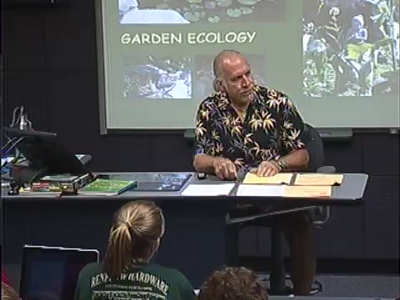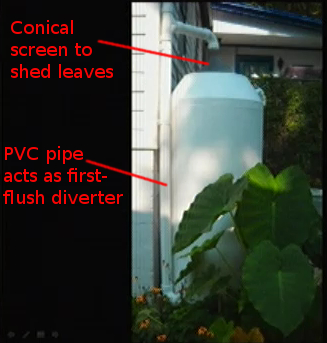
Touring an urban homestead
 I told you yesterday that I
wouldn't write a reaction post to lectures 3 and 4 until next week, but
it turned out that those lectures (especially the latter) were much
more interesting and took me less time to finish up. So here's a
rather rambling series of thoughts on those lectures and the associated
readings.
I told you yesterday that I
wouldn't write a reaction post to lectures 3 and 4 until next week, but
it turned out that those lectures (especially the latter) were much
more interesting and took me less time to finish up. So here's a
rather rambling series of thoughts on those lectures and the associated
readings.
The third lecture in the
online
permaculture course
is about garden ecology, and I felt it was a bit light (even after the
first 35 minutes of student observations ended). The only useful
tidbit I came up with was the idea of focusing on multiple-kingdom
guilds in our climate rather than on the plant-plant guilds that you
read about in tropical books (like Mollison's). I think Hooker is
spot-on with this assessment --- mixing chickens and trees or fungi and
plants has worked much better for me than companion planting.
 Lecture 4 is where the online
course begins to really shine, since it's basically an overview of the
professor's own urban homestead. Hooker shows us his Belgian
fence of apples, a grape-covered
chicken run (allowing him to shake the vines to feed Japanese beetles
to his flock), and a great rainwater-collection system (pictured to the
right). On the other
hand, you also begin to get a feel for Will Hooker's limitations in
this lecture, especially when you learn that he doesn't eat his
chickens (giving away the roosters and presumably letting his hens die
of old age). Hooker also puts a lot more effort into aesthetics
than into producing an edible
harvest.
Lecture 4 is where the online
course begins to really shine, since it's basically an overview of the
professor's own urban homestead. Hooker shows us his Belgian
fence of apples, a grape-covered
chicken run (allowing him to shake the vines to feed Japanese beetles
to his flock), and a great rainwater-collection system (pictured to the
right). On the other
hand, you also begin to get a feel for Will Hooker's limitations in
this lecture, especially when you learn that he doesn't eat his
chickens (giving away the roosters and presumably letting his hens die
of old age). Hooker also puts a lot more effort into aesthetics
than into producing an edible
harvest.
Most of the reading that
went along with these lectures was information I already knew, but
there were a few gems in Mollison's Introduction to Permaculture:
****
"The golden rule is to develop the nearest area first, get it under control, and then expand the edges. Too often, the beginner chooses a garden far from the house, and neither harvests the plants efficiently, nor cares for them well enough. Any soil can be developed for a garden over time, so stay close to the home when placing the garden and orchard."
Finally, your reading
assignment before enjoying lectures 5 and 6 is:
- "Orchards, Farm Forestry, and Grain Crops" in Introduction to Permaculture. (The book I finally tracked down is the first edition, in which this is chapter 5, but I understand it is chapter 6 in later editions.)
- "Growing a Food Forest" in Gaia's Garden.
If you're watching and
reading along with me, did other parts of these two lectures jump out
at you? Feel free to share your thoughts in the comments.
Want more in-depth information? Browse through our books.
Or explore more posts by date or by subject.
About us: Anna Hess and Mark Hamilton spent over a decade living self-sufficiently in the mountains of Virginia before moving north to start over from scratch in the foothills of Ohio. They've experimented with permaculture, no-till gardening, trailersteading, home-based microbusinesses and much more, writing about their adventures in both blogs and books.
Want to be notified when new comments are posted on this page? Click on the RSS button after you add a comment to subscribe to the comment feed, or simply check the box beside "email replies to me" while writing your comment.
